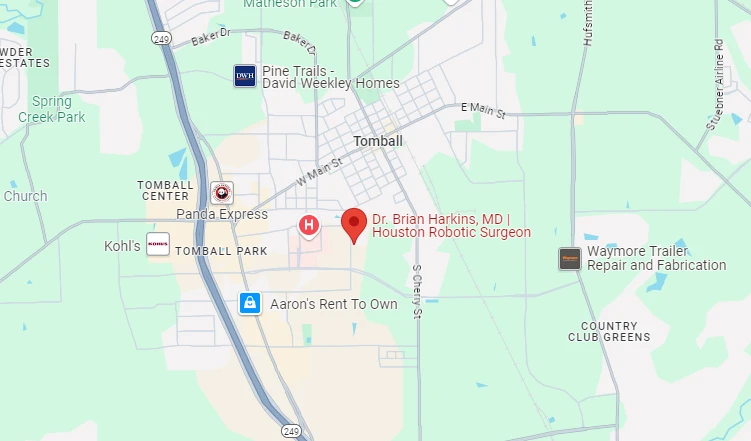
If you live in the Houston, TX area and struggle with gallbladder disease, finding the right surgeon in Houston can feel daunting. Which surgeon deals with gallbladder in Houston, TX? Board-certified general surgeons, GI specialists, and hepatobiliary experts typically perform gallbladder surgery, offering advanced techniques like laparoscopic and robotic cholecystectomy. These doctors routinely perform minimally invasive laparoscopic cholecystectomies to remove the gallbladder (cholecystectomy) with less pain, smaller scars, and quicker recovery than traditional open techniques.
The gallbladder is a small, pear-shaped organ that lies beneath the liver on the right side of the abdomen. It stores bile—a digestive fluid that breaks down fat—before releasing it into the small intestine. When gallstones or sludge block the cystic duct, inflammation of the gallbladder (cholecystitis) or even pancreas irritation can follow, leading to severe abdominal pain.
In the greater Houston area, including Sugar Land, Bellaire, and The Woodlands, you’ll find:
| Surgeon Type | Typical Training | Ideal For | Common Centers in Houston |
|---|---|---|---|
| General Surgeon | 5-year residency, American Board of Surgery cert. | Routine laparoscopic cholecystectomies, hernia repair | Houston Methodist, HCA Houston Healthcare, Memorial Hermann |
| GI / Minimally Invasive Specialist | Extra fellowship in advanced laparoscopy or bariatric surgery | Difficult gallbladders, high BMI, single-incision cases | Baylor St. Luke’s, UTHealth, specialized surgery center sites |
| Hepatobiliary Surgeon | Oncology or transplant fellowship | Gallbladder cancer, complex bile-duct injuries | MD Anderson Cancer Center, Baylor College of Medicine |
Whether you’re in downtown Houston or out in Katy, a few factors separate the best doctors from the rest:
Tip: Make an appointment early; your doctor may recommend additional lab work, nonsurgical options, or even hernia surgery at the same time if needed.
Under general anesthesia, the surgeon makes several small incisions—one at the navel and others under the ribs—to insert a camera and instruments. Through one of the incisions, the gallbladder is removed through one port. Thanks to this less invasive approach, most people walk within two hours and head home the same day.
The risk of bile-duct injury is low (<0.3 %) when an experienced surgeon in Houston performs the operation. Early walking reduces clots, while antibiotics and clean dressings cut infection. Notify your team if pain worsens, fever spikes, or nausea persists; your doctor may order imaging or ERCP.
Gallbladder removal in Houston is usually covered once signs and symptoms of stones or cholecystitis are documented. Still, verify network status to avoid surprise bills.
| Payment Type | Outpatient Laparoscopic | Inpatient Open | Notes |
|---|---|---|---|
| Commercial | Deductible + 10–20 % co-insurance | Higher with overnight stay | Pre-auth required |
| Medicare | ≈\$250–\$600 after deductible | Part A covers room/board | Supplemental lowers cost |
| Self-Pay | \$10 K–\$18 K bundle | \$20 K–\$30 K | Ask about payment plans |
From routine laparoscopic surgery to complex open cholecystectomy, Houston delivers top-tier expertise. Choose a high-volume surgeon, verify insurance, and embrace healthy habits. Schedule an appointment today to discuss how a minimally invasive procedure can eliminate pain and discomfort and restore your quality of life.
General surgeons, GI specialists, and hepatobiliary surgeons handle gallbladder removal. They typically work at top hospitals like Houston Methodist, Memorial Hermann, and Baylor St. Luke’s, providing laparoscopic or robotic options for minimally invasive care.
The technique uses a laparoscope and several small incisions rather than a single large incision. This less invasive approach results in less pain, minimal scarring, and quicker recovery. Most Houston centers offer minimally invasive options with same-day discharge for qualified patients.
Desk workers often return within one week after a laparoscopic procedure, while manual laborers may need three to four weeks. An open cholecystectomy involves a larger incision and may also become a six-week recovery. Always follow your surgeon’s customized timeline for lifting and exercise.
Mild cases sometimes improve with diet changes, weight control, and medication that dissolves small cholesterol stones. Yet these nonsurgical methods work slowly and stones frequently recur. If you experience severe or repeated attacks, surgery to remove the gallbladder remains the gold standard.
Most people digest food normally after surgery. Bile flows directly from liver to small intestine, so fatty meals may cause temporary bloating. Over several weeks, the digestive tract adapts, and patients resume regular diets without the pain and discomfort previously triggered by gallstones.
Studies show similar complication rates, but robotic tools provide greater precision in obese patients or those with prior abdominal surgery. Houston Methodist Hospital and other centers in Houston offer minimally invasive robotic platforms; ask your specialist near you if this technology fits your case.
If pathology reveals unexpected gallbladder cancer, your surgeon will consult a hepatobiliary oncology team at MD Anderson or Baylor. Additional imaging and possibly a second operation remove nearby liver tissue or lymph nodes to ensure clear margins and best survival odds.
Yes. Because both operations use laparoscopic tools, many surgeons perform combined hernia surgery and cholecystectomy during a single anesthetic event. This saves recovery time and reduces total cost. Discuss combined surgery options if you have a diagnosed ventral or umbilical hernia.
Virtually all major insurance plans, including Medicare and marketplace policies, classify gallbladder removal as medically necessary once imaging confirms disease. Verify your deductible, co-insurance, and ensure the facility and surgeon are in-network to prevent unexpected out-of-pocket expenses.
Start by calling the office of a board-certified general surgeon or GI specialist near your ZIP code. Most Houston area practices offer online scheduling. Bring prior imaging, medication lists, and ID to your visit so the team can expedite insurance approval and set a surgery date quickly.


Dr. Brian Harkins is a renowned surgeon specializing in advanced, minimally invasive, and robotic surgical techniques. With a dedication to innovation and personalized patient care, he has transformed countless lives by delivering exceptional outcomes.

I want a website like this, where do i start?